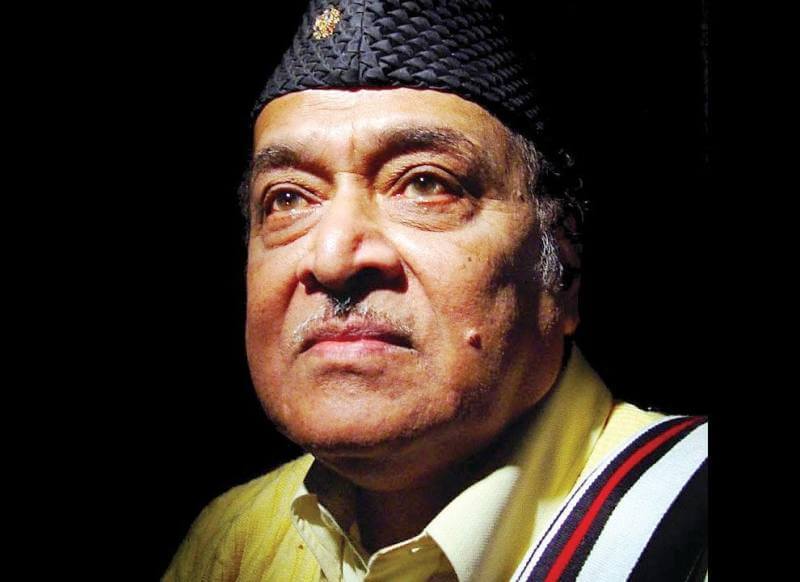Mor gaan haok bahu asthahinatar biporite
Ek gabhir asthar gaan
Mor gaan haok kalpanabilasar biporite
Ek xatyaprasathir dhyan….
(Let my songs be the songs of belief instead of many hopelessness, let my songs be the meditations of truth instead of mere luxury of imagination…)
This song is perhaps one of the most celebrated composition of the legendary singer Dr. Bhupen Hazarika, wherein the purpose of his art has been captured beautifully. Art has always been a silent reformer, and Bhupen Da’s creations are a perfect example of this.
The self-proclaimed Jajabor or the vagabond, often referred to as Xudhakantha (the sweetest voice) and the Bard of Brahmaputra, Bhupen Hazarika traveled many places around the world and perceived the universal features of mankind. His songs, imbued with Assamese culture and aesthetics created a magical tapestry of music, which continues to fascinate listeners even today.
AS Prof. Dr. Hemanta Kumar Baruah, President of Axom Xahitya Xabha, Tezpur branch says, “Almost all the songs of Dr. Bhupen Hazarika have a story behind them, which makes them more appealing and close to our hearts. If you read his autobiography ‘Moi Eti Jajabor’, you will get many instances of it.”
A man of vivacious spirit, he became a distinctive voice of the voiceless and oppressed. Most of his songs were appealing celebrations of love and humanity. One of his most celebrated songs goes like:
Manuhe manuhar babe
Jadihe akano nebhabe
Akani xahanubhutire
Bhabiba koneno kowa, samaniya?
(If a man doesn’t think about another’s plight with pity, then who will? Tell me, o my friend)
This song clearly bears all the upsetting ideals of humanity and man-made barriers. Throughout his life, Dr. Hazarika endeavored for peace, unity and brotherhood among people crossing the hefty boundaries of ethnicity, community, class and language. This song powerfully portrays his ideals and soothes the souls of the poor and the oppressed.
Xitore xemeka rati
Xemeka xitore rati
Bastra bihin kono khetiyakar…
Bhagi pora pojatir tuh jui ekurat, umi umi joli thoka,
Raktim jen eti uttap hou…
(In the cold night of winters, in the broken hut of a farmer without clothes, I want to be a burning ember…)
This heart-touching song depicts the plight of the working and suppressed class of farmers. He sought to assimilate with their grief, by being a burning ember and warm their huts.
Another one of his classics, moi eti jajabor expresses his ambitious perspective on universalism. He sings:
Bahu Jajabor lakshybihin mor piche aase pan
Rangar khani jotei dekhiso bhagai diyar mann…
(There many vagabonds who wanders aimlessly, but I want to spread the colors of happiness wherever I can…)
The lyrics says he is a vagabond and wander across countries and cities, and oceans in search of universal love. He embraces the world as his own home, as he has no family of his own.
Dr. Hazarika’s songs never praised the kings or the apathetic upper-class rulers or zamindars. His songs have mainly been about his compassion for the common people. Songs like ‘atitor buranji likhake likhise raja maharajar katha, aajir buranji likhake likhise manuhar mukutir katha’, and ‘Dola he dola, ekabeka batere karhiyao karhiyao bor bor mahunar dola’ are some fine examples.
During the Assam Revolution in the eighties, when ethnic clashes between Assamese and Bengalis were at the peak, the legendary singer played a vital role in the revolution with his songs. During this time he composed popular songs like ‘Juye pora tiraxir nirbachani bosor’ and ‘akou jadi jabo lage xaraighatoloi’.
“Dr. Bhupen Hazarika is a humanitarian in the real meaning of the term. The perspective of love and global fraternity was always obvious in his songs. The main purpose of his songs was spreading love and peace among the hearts of common people. The portrayal of sorrow and anxiety of the socio-economically deprived classes was one of the most remarkable element of his melodious songs. It is because of this religiousness in his songs, he is still relevant in the 21st century impacting lives of millions,” states Mridul Kumar Sahariya, the former secretary of Axom Xahitya Xabha, Sonitpur.

Dr. Bhupen Hazarika was a lover of people, loved by people. His entire life philosophy was shaped by seeking justice for the oppressed and bringing social change to the world. His songs echoed their sufferings, pains, hopes, and laughter which made him one of them. A harbinger of social change and the diligent voice, Dr. Bhupen Hazarika will always remain in our hearts, encouraging us to fight many more battles in years to come.
By Upama Goswami

